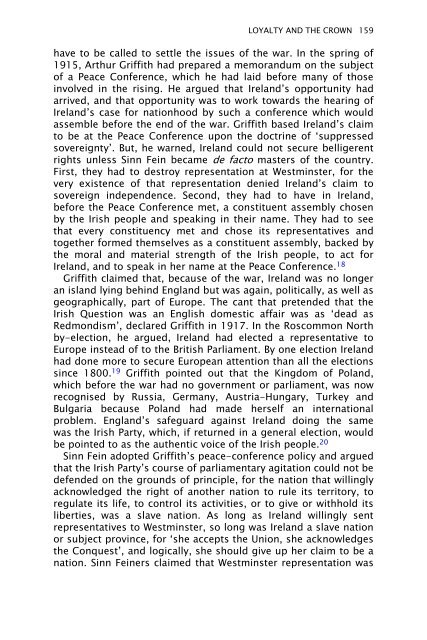Dividing Ireland: World War I and Partition
Dividing Ireland: World War I and Partition
Dividing Ireland: World War I and Partition
Create successful ePaper yourself
Turn your PDF publications into a flip-book with our unique Google optimized e-Paper software.
LOYALTY AND THE CROWN 159<br />
have to be called to settle the issues of the war. In the spring of<br />
1915, Arthur Griffith had prepared a memor<strong>and</strong>um on the subject<br />
of a Peace Conference, which he had laid before many of those<br />
involved in the rising. He argued that <strong>Irel<strong>and</strong></strong>’s opportunity had<br />
arrived, <strong>and</strong> that opportunity was to work towards the hearing of<br />
<strong>Irel<strong>and</strong></strong>’s case for nationhood by such a conference which would<br />
assemble before the end of the war. Griffith based <strong>Irel<strong>and</strong></strong>’s claim<br />
to be at the Peace Conference upon the doctrine of ‘suppressed<br />
sovereignty’. But, he warned, <strong>Irel<strong>and</strong></strong> could not secure belligerent<br />
rights unless Sinn Fein became de facto masters of the country.<br />
First, they had to destroy representation at Westminster, for the<br />
very existence of that representation denied <strong>Irel<strong>and</strong></strong>’s claim to<br />
sovereign independence. Second, they had to have in <strong>Irel<strong>and</strong></strong>,<br />
before the Peace Conference met, a constituent assembly chosen<br />
by the Irish people <strong>and</strong> speaking in their name. They had to see<br />
that every constituency met <strong>and</strong> chose its representatives <strong>and</strong><br />
together formed themselves as a constituent assembly, backed by<br />
the moral <strong>and</strong> material strength of the Irish people, to act for<br />
<strong>Irel<strong>and</strong></strong>, <strong>and</strong> to speak in her name at the Peace Conference. 18<br />
Griffith claimed that, because of the war, <strong>Irel<strong>and</strong></strong> was no longer<br />
an isl<strong>and</strong> lying behind Engl<strong>and</strong> but was again, politically, as well as<br />
geographically, part of Europe. The cant that pretended that the<br />
Irish Question was an English domestic affair was as ‘dead as<br />
Redmondism’, declared Griffith in 1917. In the Roscommon North<br />
by-election, he argued, <strong>Irel<strong>and</strong></strong> had elected a representative to<br />
Europe instead of to the British Parliament. By one election <strong>Irel<strong>and</strong></strong><br />
had done more to secure European attention than all the elections<br />
since 1800. 19 Griffith pointed out that the Kingdom of Pol<strong>and</strong>,<br />
which before the war had no government or parliament, was now<br />
recognised by Russia, Germany, Austria-Hungary, Turkey <strong>and</strong><br />
Bulgaria because Pol<strong>and</strong> had made herself an international<br />
problem. Engl<strong>and</strong>’s safeguard against <strong>Irel<strong>and</strong></strong> doing the same<br />
was the Irish Party, which, if returned in a general election, would<br />
be pointed to as the authentic voice of the Irish people. 20<br />
Sinn Fein adopted Griffith’s peace-conference policy <strong>and</strong> argued<br />
that the Irish Party’s course of parliamentary agitation could not be<br />
defended on the grounds of principle, for the nation that willingly<br />
acknowledged the right of another nation to rule its territory, to<br />
regulate its life, to control its activities, or to give or withhold its<br />
liberties, was a slave nation. As long as <strong>Irel<strong>and</strong></strong> willingly sent<br />
representatives to Westminster, so long was <strong>Irel<strong>and</strong></strong> a slave nation<br />
or subject province, for ‘she accepts the Union, she acknowledges<br />
the Conquest’, <strong>and</strong> logically, she should give up her claim to be a<br />
nation. Sinn Feiners claimed that Westminster representation was








